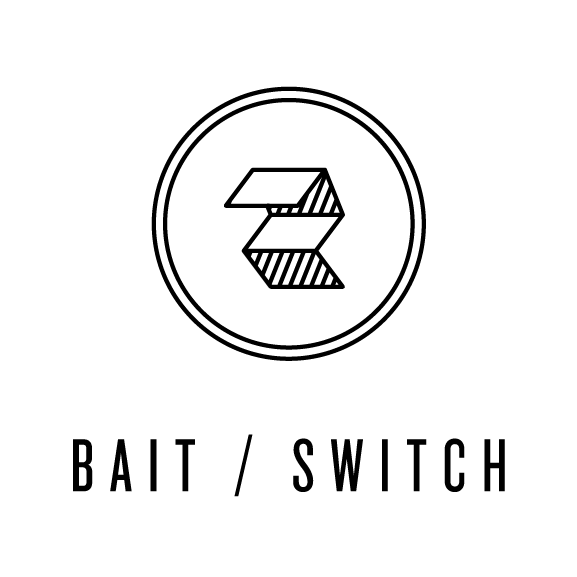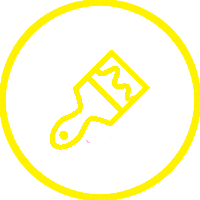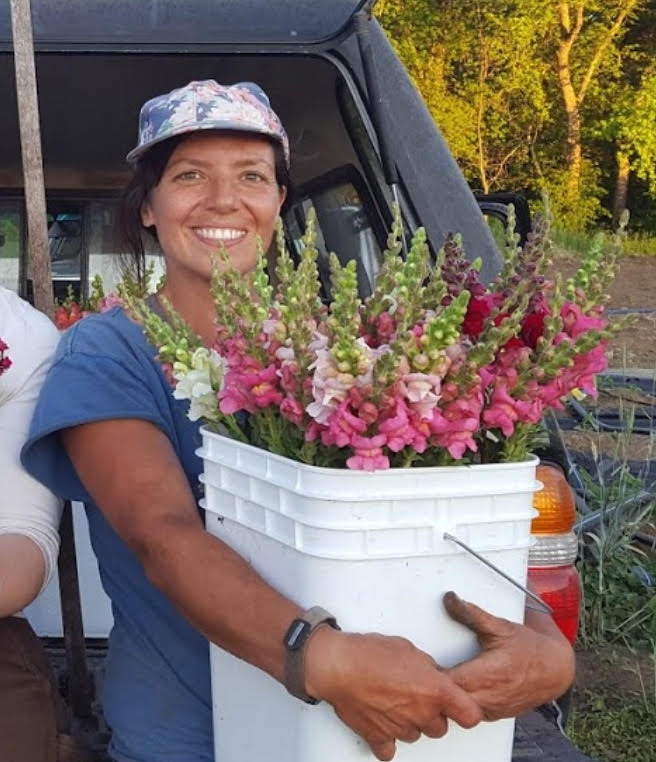Our Lady of bread and roses
Melanie Hardy
“This painting is really about transcending all that is put on you, but also making that stuff your own.”
Interview by L. Valena
First off, please tell me what you responded to.
I received a piece of music; it was entitled ‘Lady’ and it was a beautiful piano piece with some vocals in it.
What was your initial reaction to the piece, and how did you translate those feelings to this piece that you made?
There are points in the music where the composer/singer is singing... I think she's singing ‘soar soar soar’, so in my piece there's a woman kind of levitating and growing in the center of the piece. There's a lot of language in the song that I could interpret pretty clearly, that was about… I don’t remember exactly what the words were, but they were about manipulating a breast or something like that. I’ve been thinking so much about my feminism lately- about how women are shaped and treated and coddled and protected, and also criticized in so many different ways. I also starting doing research into the word ‘lady’- it comes from this old Germanic word that means ‘loaf keeper’ or bread keeper.
That’s amazing! I was wondering about the bread!
This is what I love about art- you start really just thinking about stuff and it leads you down this path and you learn so much. So that’s where the loaves came from. And I wanted to create this feeling… with that title, and that burden of being the loaf keeper, and the homemaker. Comparing dough to my interpretation of what she was singing about- a woman being protected and shaped. So this painting is really about transcending all that is put on you, but also making that stuff your own.
Some of what I read about the word ‘lady’ was that at one point (and in some cases, still) it suggested high class status and nobility. Now it’s sometimes used to dismiss someone or to refer to the work lower class women do (think cleaning lady, etc) or a group of women being feminine together (ladies). I could go on about the positive and negative connotations and reclamations of the word, but I was really thinking about sainthood, my mom (who has also been a “cleaning lady” to make ends meet at different points) and the origin of the word. All of this combined with what I heard in this song (a struggle and then a release and then a peace) was how I came up with this piece of work.
And this theme of radical femininity and home arts definitely seems important.
And reclaiming that. It can be a burden still, for a lot of women who do housekeeping work and cleaning work, that is not always an empowered relationship. I was definitely thinking of my mom a lot, and the woman [in the piece] is essentially a younger version of her. She did so much invisible work when I was younger, and with her resourcefulness, she created sustenance, beauty, and magic often from nothing . The imagery of abundance and lushness around her is reflecting that generous resourcefulness and caretaking . That is one of the most amazing things about both her own femininity and her homemaking, and she passed that along to my both sister and me. I feel so grateful now, but of course when I was little I had no idea what motherhood in a traditional working class, nuclear family household was like: she worked every day, had dinner on the table by 6 every night, made sure everything was clean, etc. I marvel at all she did now....again, creating so much with so little time, which is just another resource.
Another thing is that the piece, visually, was definitely inspired by the Our Lady of Charity candles my mom lights to pray for positive outcomes and healing. My mom is from Cuba, and Our Lady of Charity is the patron saint of Cuba. We grew up with those candles and necklace pendants around us. But it also ties into the title of the song (Lady) and some of the content.
How does this relate to the rest of your work? I see there are plants involved in this piece, and I know that plants are a big part of the rest of your work.
Yeah. So, professionally I am a farmer- I grow flowers and vegetables. Most of what I paint are botanical drawings, and paintings of food, and a lot of that is represented here. My usual style of painting is very painstaking, so instead of painting everything, I did collage for the plants and the pictures of flowers. And I used things from my garden- dried bits of hydrangea. The loaves are made of bark from a birch tree in my yard- there’s lots of nature and flowers and plants incorporated in my artwork, and that shows up here.
How was this experience for you? Do you feel like this unlocked something that begs further exploration?
Yes! I mean, whether or not I’ll be able to, it unlocked the desire for further exploration. I feel like I got just a taste of wanting to do, I don’t know, the kind of art that explores more. This really did awaken something in me.
Call Number: Y2MU | Y4VA.haOu
Melanie Hardy is a vegetable and flower farmer by profession, and sometimes visual artist. When she's not at the farm, she can be found tending to her home garden, listening to podcasts and audiobooks, spending time outside, obsessing over fiber arts, and cooking feasts for friends/family. She lives in a small town with her longtime partner and a trio of senior animals.


